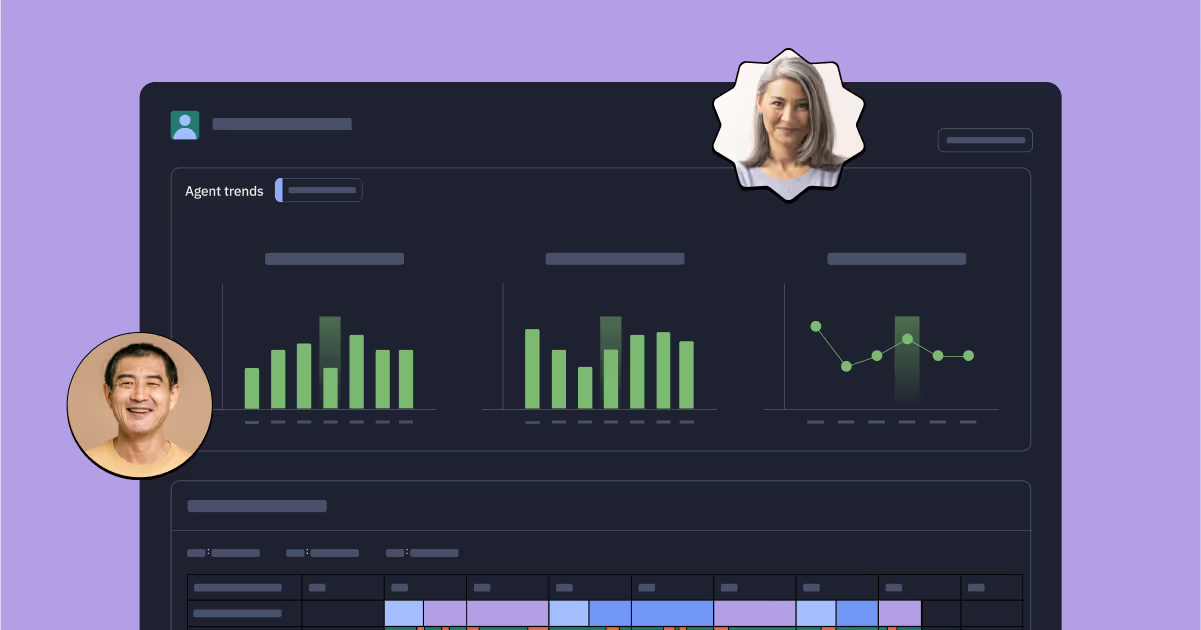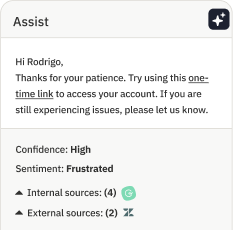Call center scheduling software - Assembled

Call center scheduling software
Managing a call center comes with its own set of challenges, and one of the biggest is effective scheduling. Call centers — whether focused on handling incoming customer inquiries or driving outbound sales — rely on the right staffing levels to ensure smooth operations and deliver a seamless customer experience. Yet balancing agent availability, customer demand, and unforeseen changes can often feel like solving a puzzle without all the pieces.
Call center scheduling software offers a solution. By providing a centralized, digital view of work schedules and employee availability, it empowers managers to identify gaps, adjust coverage in real time and streamline shift management for call center agents. These tools improve efficiency for both agents and managers, reducing manual effort while ensuring optimal coverage to meet fluctuating call volumes and customer needs.
Call center workforce management software
Effectively managing a call center workforce requires more than just filling shifts — it’s about creating systems that adapt to the scheduling needs of both employees and the business. Workforce management software plays a key role in streamlining this process, offering flexibility and visibility for managers and agents alike.
A cornerstone of successful workforce management is empowering agents with autonomy. When employees can access schedules, request changes, swap shifts, or plan their time off within a structured system, it not only builds trust but also fosters accountability. Managers, meanwhile, can maintain oversight of agent scheduling to ensure any adjustments still meet operational requirements.
Equally important is communication. A robust workforce management process includes tools that make it easy for teams to share updates, leave notes, and flag issues in real time. Clear communication prevents scheduling gaps and ensures smooth operations, even when unforeseen changes arise. By combining transparency, flexibility, and effective communication, call centers can create a more agile and efficient workforce management system.
Employee scheduling software
Employee scheduling software is a vital component of call center workforce management, enabling businesses to align staffing with demand while accommodating the unique needs of their industry. Whether the operation runs standard business hours or offers 24×7 support, effective scheduling tools ensure the right people are in the right place at the right time.
Key features to consider in scheduling software include the ability to forecast staffing needs accurately. By analyzing historical data and anticipating future demand, these tools help prevent gaps in coverage and ensure operations run smoothly. The further ahead the software can project, the more time businesses have to plan and adapt.
Flexibility is another critical feature. Scheduling software should make it easy for employees to swap shifts or request scheduling changes, reducing the burden on managers while ensuring coverage remains intact. This capability is especially important for accommodating unexpected absences, vacations, or fluctuating workloads.
Finally, robust scheduling tools should include overtime tracking. By monitoring overtime hours and flagging potential issues early, businesses can better manage labor costs and maintain budgetary control. With these capabilities, employee scheduling software becomes a cornerstone of efficient, proactive workforce management.
Workforce management services
Workforce management involves a variety of tasks aimed at ensuring a well-coordinated and efficient operation, particularly in dynamic environments like call centers. While some companies rely on workforce management (WFM) software to address key challenges, others may choose to work with external consultants or specialists for added support.
Common challenges in workforce management include time and attendance tracking, where managers need tools to monitor employee punctuality, identify gaps, and address no-shows effectively. Another critical area is workforce forecasting. Contact center staffing needs often fluctuate based on demand, so the ability to predict and adjust staffing levels proactively is essential to maintaining service quality.
Advanced WFM software provides solutions to these challenges, offering a suite of workforce management tools, including time tracking, attendance management, and forecasting, while also enabling self-service features for call center employees. By adopting the right software, companies can streamline staff scheduling, reduce their reliance on outside consultants, and respond quickly to unexpected situations — all while saving time and money. The key is to choose a solution that aligns with specific organizational and business needs and empowers both managers and employees to succeed.
Employee schedule maker
Empowering employees to have input in their schedules not only fosters autonomy but also creates a more adaptable and collaborative work environment. Online employee schedule makers make this process seamless by providing a centralized, editable platform accessible to both managers and team members. These tools allow for real-time updates, simplified shift swapping, and a clear overview of staffing needs.
Many businesses turn to employee scheduling apps for their ease of use and robust functionality. These apps often include features like automated scheduling, shift reminders, and built-in communication tools. When evaluating options, it’s important to consider factors like pricing, user reviews, and compatibility with existing systems to ensure the right fit.
For smaller teams or those exploring workforce management solutions, spreadsheets like Excel can be a practical starting point. While it lacks the automation and advanced features of dedicated scheduling apps, Excel’s flexibility — with color coding and formulas — can help teams organize shifts and build a case for investing in more comprehensive scheduling software. Regardless of the tool, the goal is to create a scheduling process that’s efficient, transparent, and responsive to the needs of both employees and the business.
Call center forecasting software with Assembled
Forecasting is a critical part of effective call center management. Ensuring the right number of agents are scheduled to meet fluctuating demand can significantly impact customer satisfaction and operational efficiency, making advanced call center software a vital tool for modern operations. While some teams rely on basic tools like Excel templates, modern call centers need a more dynamic solution to handle the complexities of staffing. This is where Assembled’s workforce management solutions come into play.
Optimize staffing with Assembled’s forecasting and scheduling tools
Assembled’s Forecasting solution empowers call centers with optimization of staffing needs by analyzing historical data and integrating real-time updates. Whether you manage an in-house or outsourced team, our tools help ensure the right coverage at all times, reducing costs and improving key metrics like service level agreements (SLAs).
Meanwhile, our Scheduling solution automates the scheduling process with an intuitive, user-friendly interface, saving managers time and minimizing errors. With features that enable rapid staffing adjustments, Assembled helps call centers respond to changes in demand with precision and confidence.
Enhance efficiency with Assembled Assist
In addition to improving forecasting and scheduling, Assembled Assist adds another layer of efficiency by helping support teams resolve tickets faster. By integrating scheduling insights with operational needs, Assembled Assist optimizes resource allocation, reducing response times and ensuring your team can focus on what matters most: delivering exceptional customer support.
Ready to see the difference?
With tools designed to streamline operations and improve outcomes, Assembled helps call centers take control of their workforce management processes. Request a demo today to see how Assembled can transform your scheduling, forecasting, and team performance.



_%20Improve%20CX%20%26%20cut%20costs.avif)
